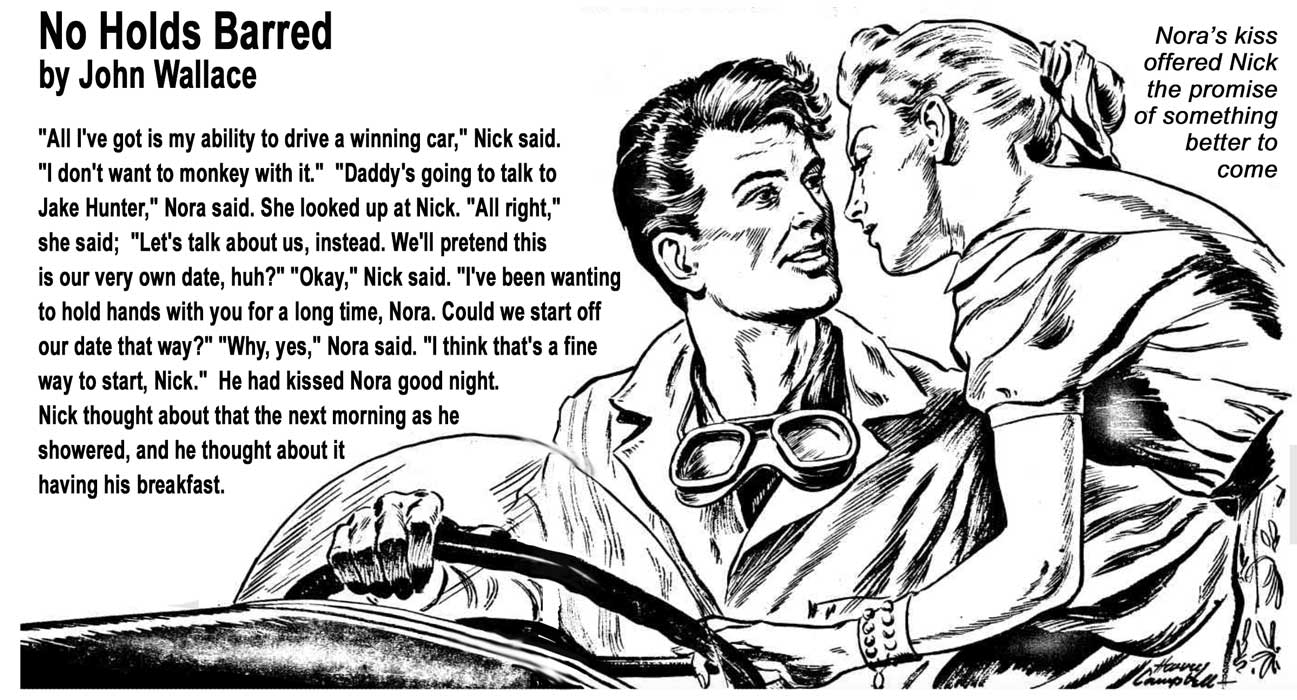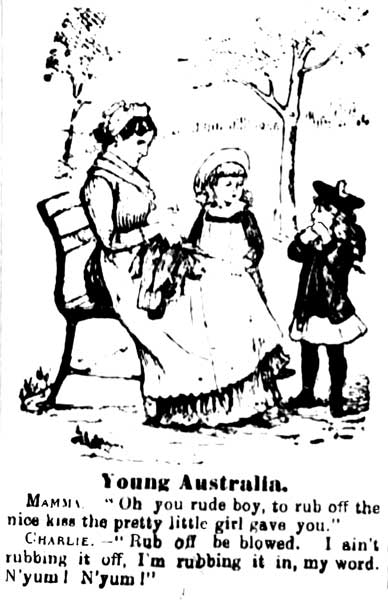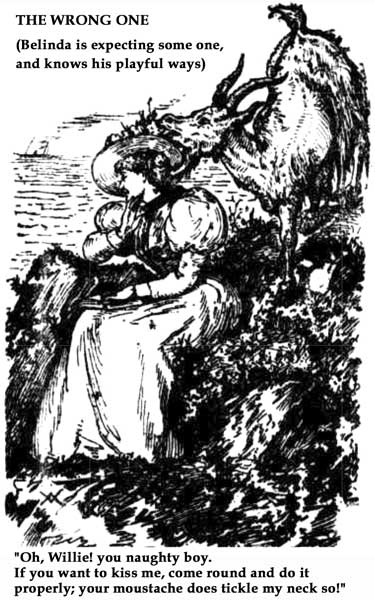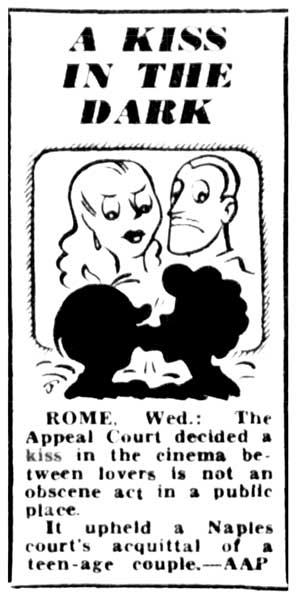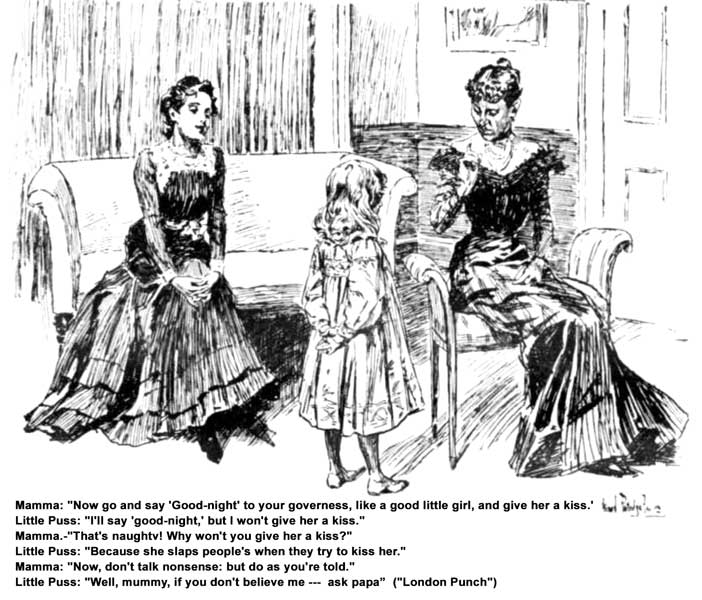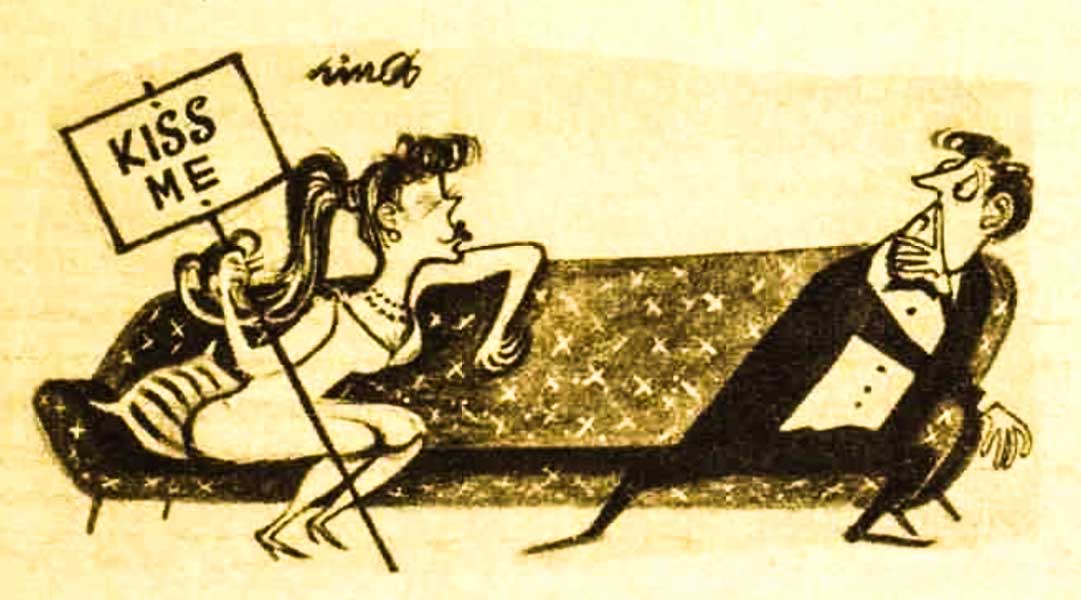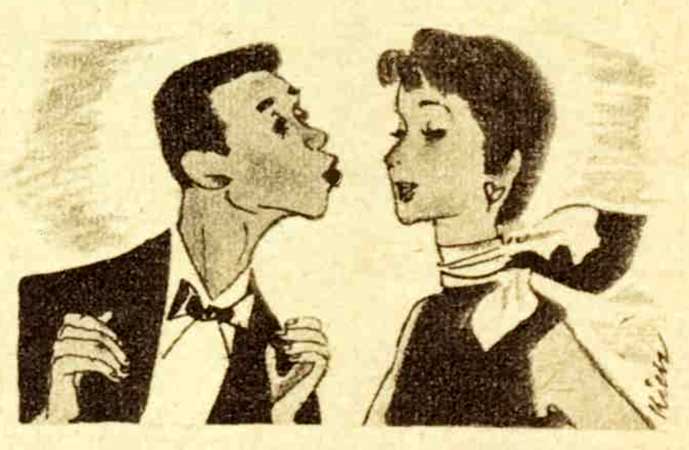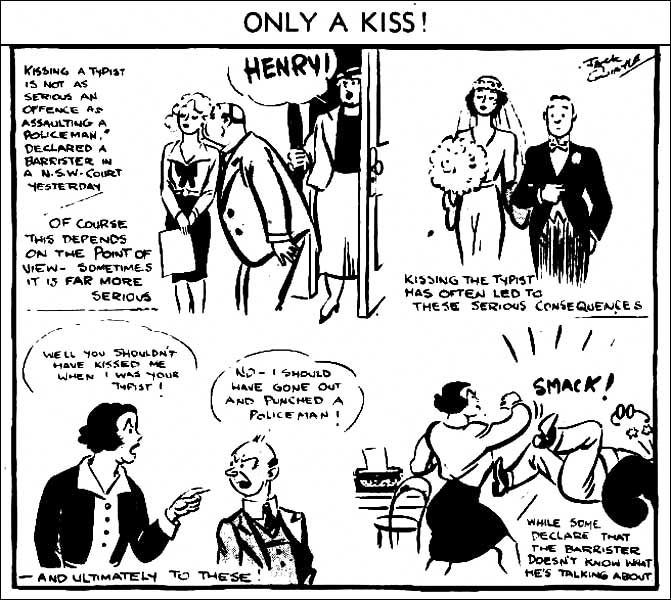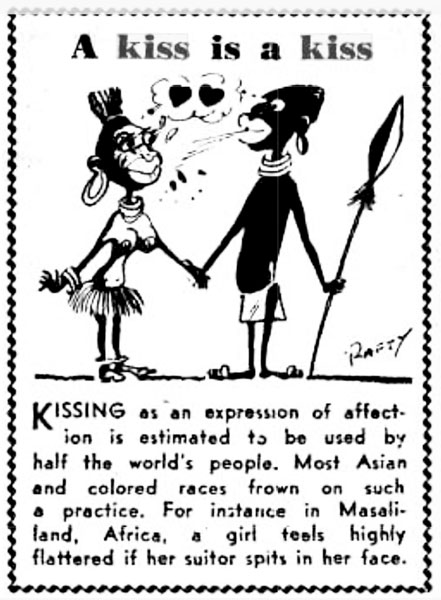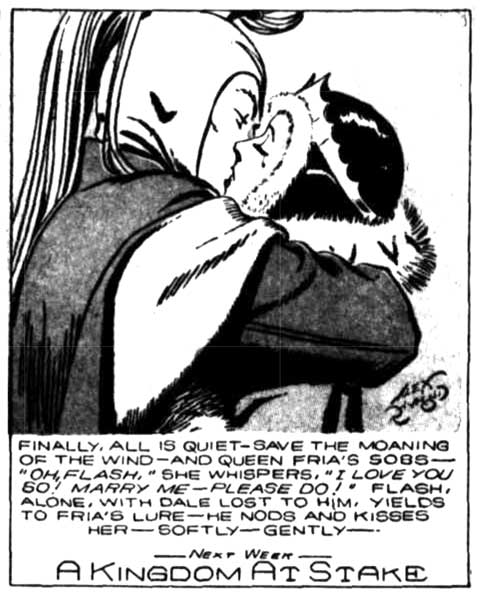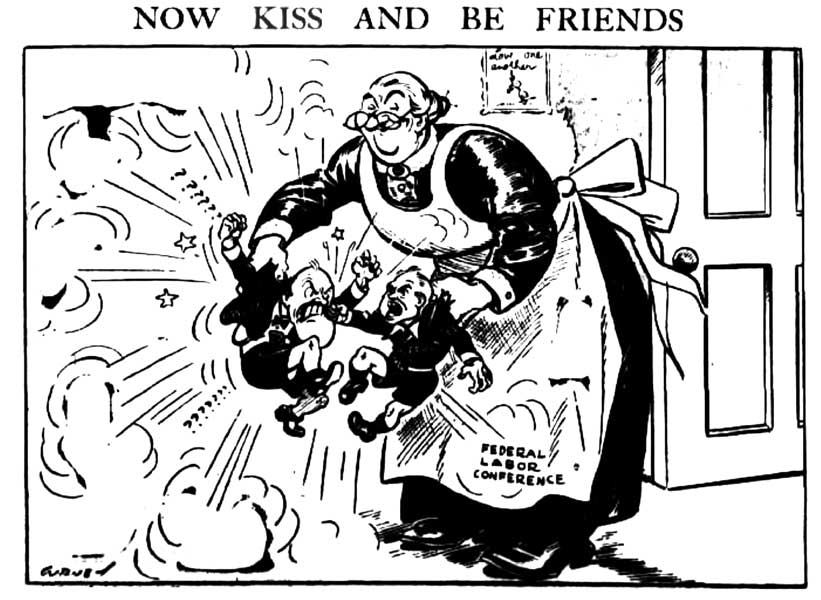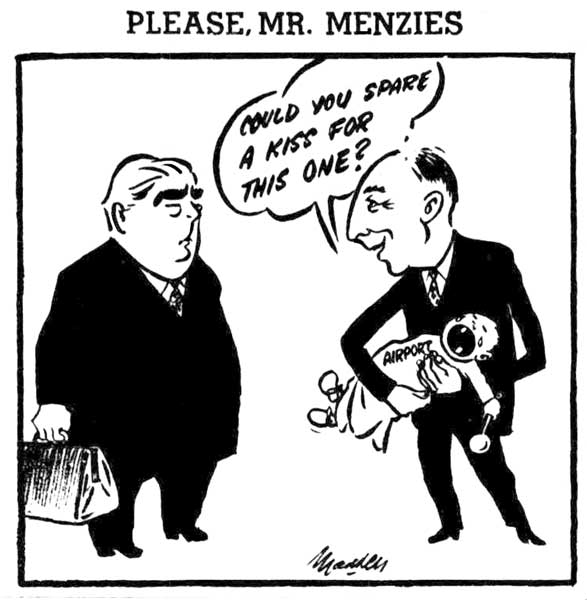Floggin’ Noggin’ Snoggin’
 KISSING
KISSING
0dysseus kissed his head, shoulders and hands. Kissing the image of a God was a recognised rite of adoration among Romans. On leaving and entering the house they kissed the house gods. In the Eleusinian Mysteries the sacred Objects were kissed. Adoration literally means touching with the mouth. Diocletian introduced the kiss of honour which was given by the Emperor for particular merits in the public welfare, just as decorations are given today. The adoration of the Roman Emperors was influenced by Oriental ceremonial. It consisted in bowing and kneeling; touching the robe; a variation was the kissing of the feet or knees. It does not seem to have become the fashion before Diocletian.
The Romans’ Customs
When the Romans went into a temple they dipped their fingers into a font of ‘holy water’ before they adored the gods or goddesses, this was done by kissing the hand and waving it towards the Gods (throwing a kiss) or by kissing the image, or feet of the image, of the deity. The index finger was used by the Romans as that by which the gods and people were saluted with a kiss or otherwise; here perhaps, it was called salutaries digitus. Kissing the hands of images of the gods was an act of worship and kissing one’s own hand to a person or to a divinity has doubtless the same significance of respect or worship. The Roman used to lift up the hand in prayer, first raising the hand to the mouth (kissing the hand) and making a complete turn to the right. Aobias Smollett, in a letter dated March 20, 1765, describes a statue of Christ by Michael Angelo in the church of S.Maria Sopra Minerva in Rome. He says; ‘The right foot, covered with bronze gilt is much kissed by devotees.’
Vaughan, in his Golden Grove (1608) says that….
among the Romans the future couple sent certain pledges one to another which most commonly, they themselves afterwards being present, would confirm with a religious kiss. According to the old Roman law a married woman who permitted any one but her husband to kiss her, lost dower. Among the Romans it was specially in connection with marriage that the kiss, osculum oscle, was prominent. Osculare meant dotare; and osculum interveniens was a term applied to gifts between engaged persons. If one of them died before marriage, the presents were returned should no kiss have been given at the betrothal. It is significant that the kiss was symbolical of marriage as ”initium-consummations nuptiarum.”
Pleasures of Kissing
Under the early Roman Empire the practice of kissing assumed remarkable forms in social intercourse; it was fashionable, for instance, to perfume the mouth. Caligula (A.D. 37-41) used to kiss Mnester, the pantomimic, publicly in the theatre. There were numerous other in stances of kissing between men among the Romans, with whom it appears to have been a common custom, for example Nero (A.D. 59-62) kissed and embraced Seneca. Roman writers frequently referred to the pleasures of kissing and used to describe the lips which they considered would afford the greatest satisfaction.
Register (Adelaide, SA : 1901 – 1929), Tuesday 1 May 1928, page 13
KISSING
(By “Obandos”)
Any quiet observer will be impressed in our own day with the public demonstrations in the art of kissing. Years ago the privacy necessary for the exercise of such a delightful thing was a foregone conclusion. Naturally the mind inquires whence came this popular custom and how did it arise? Curiously, native tribes and primitive man do not seem to have exercised the lips in this fashion. It seems to be a product of more civilised times. We have read that kissing was introduced into England in the times of Rowena, the daughter of Hengist the Saxon. At a banquet which the king gave in honour of his allies, the princess, after pressing the brimming beaker to her lips, saluted the astonished and delighted Vortigern with a little kiss after the manner of her own people. So well did the kiss thrive in the genial surroundings of England that it gradually grew into an everyday custom and the English soon became celebrated far and near as a kissing people. As an instance of this celebrity Lord Cavendish, when visiting the chateau of a French nobleman, was met by the nobleman’s wife accompanied by a train of attendant maidens, for the purpose of paying honour to her husband’s guest and was accosted as follows:—
Seeing you are an Englishman, in whose country it is the custom to kiss all ladies without offence, even though it is not so in this realm, yet I make so bold to kiss you, and so shall all my maidens.
KISSING (1924, December 27). The Daily Mail (Brisbane, Qld. : 1903 – 1926), p. 14.
Kissing
The pernicious practice of kissing ought to be abolished. At least such was the dictum of that learned analyst of food and beer, Mr Sydney Gibbons, at the last meeting of the Victorian Medical Society. This gentleman did not go so far as to place an actual taboo upon osculation of all sorts and would probably permit a chaste salute between husband and wife or long-separated relatives. But he sets his face entirely against the kissing of children, the habit to be provocative of the dissemination of measles, diphtheria, scarlet fever and other communicable maladies. The germ of disease he declares, is carried about in the clothing of women and therefore is more likely to be imparted by the imprint of a kiss than by any other means. This may be Tory good logic, but it does not come home to the ordinary lay-understanding. We are not aware whether Mr Sydney Gibbons be bachelor or benedict, but are satisfied that were he Peter the Hermit himself, the preaching of his crusade would fall upon idle ears. We take the gentleman to be a better authority upon beer than kissing.
Ballarat Courier (Vic. : 1869 – 1880; 1914 – 1918), Thursday 6 July 1876, page 3
The Case For The Kiss
Francis Gribble
“You must not be angry with me, Pauline, for I have been sorry ever since. You must rather pity me for being weak. For the whole air seemed full of poetry and passion. And she was very pretty, and she nestled very close to me, and then, forgive me, Pauline, I hardly knew what I was doing, and it all happened such a long time ago – then I put my arm round her waist, and she let her head fall on my shoulder and looked up, with her lips a little parted, expecting to be kissed. And then—–”
“And then?” Pauline repeated.
“And then, Pauline, I remembered you. It seemed to me that, through the hazy white mist of the broken water I saw your beautiful gray eyes looking at me sadly, reproachfully. I was ashamed and horrified. I wished that I had never met this girl”
“So you never kissed her after all!” She said it jubilantly, and I should have lied. It was the psychological moment for a lie. It was better that she should misjudge me than that I should give her pain. And yet it hurt me to be misjudged, and I protested “Pauline. Pauline, how could I help kissing her?’ I said.
North Melbourne Gazette (Vic. : 1894 – 1901), Friday 21 April 1899, page 2
KISSING
The question whether real kissing is permissible on the stage is being hotly discussed in the Press and theatrical circles in Vienna. During the ten representations of a new piece all went well. The actress, Frau Leuthold, a married lady, allowed herself to be kissed as required. But before the curtain rose on the eleventh evening she declared that her husband had forbidden real kissing. When the scene came on again she held both her hands before her face, and the actor forcibly took them away to imprint the kisses on her cheek — a contretemps which of course ruined the effect. The role was then taken from Frau Leuthold. She also refused to allow any real kisses in another piece where they were also deemed essential, and accordingly she was dismissed, though she was one of the most talented and also one of the prettiest members of the company. Her dismissal occurred only two days ago, and since then the question “to be kissed or not be kissed” on the stage has monopolised public attention. Nearly every actress of renown has been asked her opinion by the Viennese newspapers. The majority favour the kiss.
KISSING. (1895, March 16). Adelaide Observer (SA : 1843 – 1904), p. 40.
KISSING
By Alfred Fowler
True loves the world over will hail with chirps and smacks of delight the new discovery of Alfred Fowler, B.A. He announces in a book now hot from the press that there are eight classes of kisses. Draw near loving hearts, give your attention and ye shall be edified. Here are Mr. Fowler’s eight divisions of kisses :
- The kiss of passion.
- The parental and filial kiss.
- The kiss of affection (always between women).
- The devotional kiss.
- The fraternal kiss.
- The kiss of curiosity.
- The kiss of treachery.
- The freshly evil kiss.
All of which he is free to maintain. Mr. Fowler, who has studied so much about love and kisses that he is worthy of more than a mere B.A. degree. He is a veritable Magister Allium de Amore Osculisque. If any reader of these lines has been too hasty in his doings, too anxious to get-rich-quick, too preoccupied with work or play to pay proper heed to the gentle art of kissing, let him hasten to Mr Fowler and study the subject in all its branches. The book is called ‘Curiosities of Kissing.’
FAMOUS DEFINITIONS OF THE KISS
Mr. Fowler does not rely altogether upon his own judgement of kisses. He quotes the definitions of a score of authors. The best of these are :
- Kisses are the messengers of love — Ooilz
- Kisses! They are the blossoms of love — Ninon de L’Enclos
- Kisses are love’s great gallery — Grashaw
- A kiss is not the feast, it is an invitation to the feast — Randolph
- A kiss is the door that opens the citadel of the heart — De Levis
- What is a kiss? A receipt given by a lady on your paying your addresses — Wit and Humour
- A kiss is at once the token of boldness, confidence and affection — Nephus
- A kiss is an alms which enriches him who receives without impoverishing her who gives — Ninon de L’Enclos
- When two hearts are charged with loves electricity, a kiss is the burning contact, the wild, leaping flame of love’s enthusiasm — G.D. Prentice
In the chapter devoted to the ethnology of kissing, Mr. Fowler’s research discloses that the kiss was unknown among the aboriginal tribes of America and Africa. He says:
The Mongolian kiss, however, is not the same as that which prevails with us. In it the lips do not touch the surface of the person kissed. The nose is brought into light contact with the cheek, forehead or hand, the breath is drawn slowly through the nostrils, and the act ends with a slight smack of the lips. The Chinese consider our mode of kissing full of coarse suggestiveness and our writers regard their method with equal disdain. Darwin and other naturalists have attempted to trace back the kiss to the act of the lower animals who seize their prey with their teeth. The Terrible Turks have a proverb which our author quotes with seeming approval. Kiss ardently the hand you cannot cut off.
The Rev. Sidney Smith says :
There is much virtue in a kiss when well delivered. We have the memory of one we received in our youth, which lasted us forty years, and we believe it will be one of the last things we shall think of when we die.
Penshurst Free Press (Vic. : 1901 – 1918), Friday 2 February 1906, page 1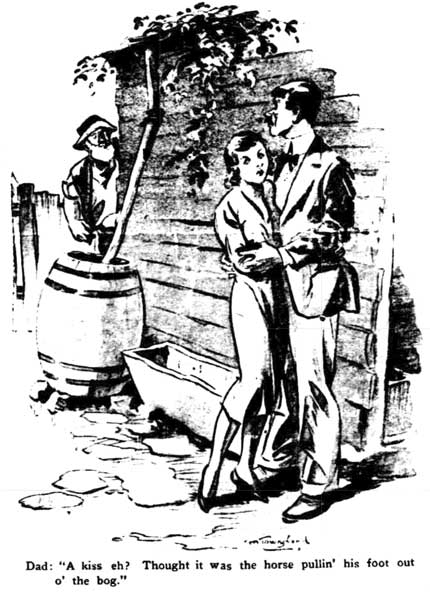
CRICKET CURIOSITIES (No. 48)
INTEREST FOR STOLEN KISS
When Joe Darling’s team of 1905 was voyaging to England one of its members saw a woman resting on a deck chair, apparently fast asleep. He stole quietly up and took a kiss, but before he could remove his lips from the lady’s rosy cheeks she held him by the collar and in a commanding voice ordered him to put the kiss back again. Delighted, he saluted the other cheek.
Sun (Sydney, NSW : 1910 – 1954), Wednesday 1 January 1930, page 10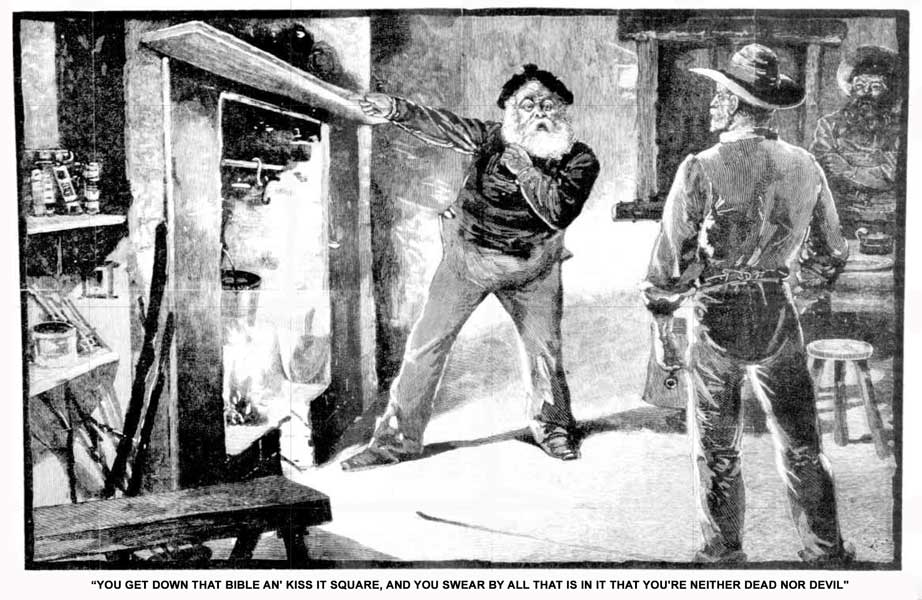
THE KISS
The kiss is a peculiar proposition. Of no use to one, yet absolute bliss to two. The small boy gets it for nothing; the young man has to lie for it. The baby’s right, the lover’s privilege, and the hyprocrite’s mask. To a young girl, faith; to a married woman, hope; and to an old maid, charity
Burra Record (SA : 1878 – 1954), Wednesday 18 October 1933, page 4
He Must Kiss A Bald Patch
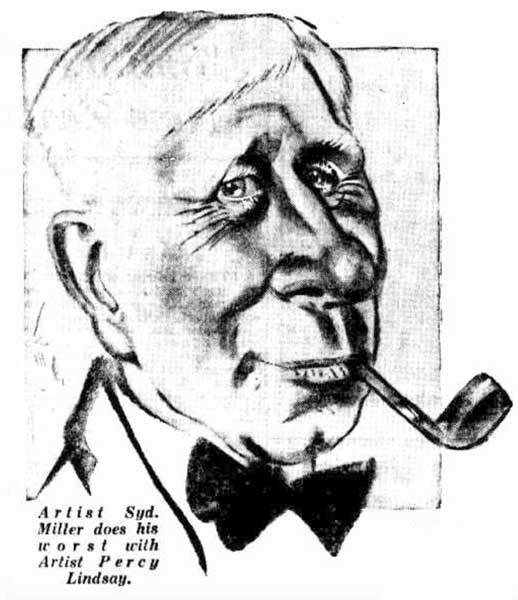 Norman Lindsay, famed for his hectic art, leads a quiet life. Elder brother Percy has always preferred quiet art and a hectic life. He paints restful landscapes, but cannot resist the temptation to kiss bald men on the top of the head. His friends saw him one day swaggering around various parts of Sydney with a sailor. Percy was wearing a naval cap and the sailor was wearing Percy’s hat. They were warm friends, but later that night Percy arrived at the Press Club with a black eye. It seemed that he had gone down to the wharf to give the Navy man a send-off. When they were changing hats he noticed that his friend was bald, so he kissed the top of his head. His friend then gave him a black eye.
Norman Lindsay, famed for his hectic art, leads a quiet life. Elder brother Percy has always preferred quiet art and a hectic life. He paints restful landscapes, but cannot resist the temptation to kiss bald men on the top of the head. His friends saw him one day swaggering around various parts of Sydney with a sailor. Percy was wearing a naval cap and the sailor was wearing Percy’s hat. They were warm friends, but later that night Percy arrived at the Press Club with a black eye. It seemed that he had gone down to the wharf to give the Navy man a send-off. When they were changing hats he noticed that his friend was bald, so he kissed the top of his head. His friend then gave him a black eye.
Smith’s Weekly (Sydney, NSW : 1919 – 1950), Saturday 29 April 1939, page 4
Kiss, 1942 Model
If a girl wanted to send a kiss to her A.I.F. sweetheart in the last war, the best she could do was put a cross at the bottom of her letter. It was pretty tame kissing. But in this war kisses are different. The superintendent of mails (Mr. Martin) told me today that hundreds of letters sent from South Australia to the A.I.F. have the lipstick impression of a kiss on the back of an envelope. Alongside the lipstick kisses many girls write their names. Sometimes there are three or four kisses on an envelope and three or four names. Some of those soldiers are regular Romeos. Some girls put a strand of their hair under the stamps. Others send along what amounts to a real breath of affection – they sprinkle a liberal coating of their favorite powder over the pages of their letters. Some envelopes have so much powder inside they burst open, under pressure in the mail bag, with the result that Tom and Bill and Harry and Joe get a whiff of Jack’s letter from his best girl. Some girls sketch typical home scenes in their letters for the boys far away. Incidentally, about half the letters that go to the A.I.F. from South Australia are written by fathers and brothers.
News (Adelaide, SA : 1923 – 1954), Wednesday 14 January 1942, page 2
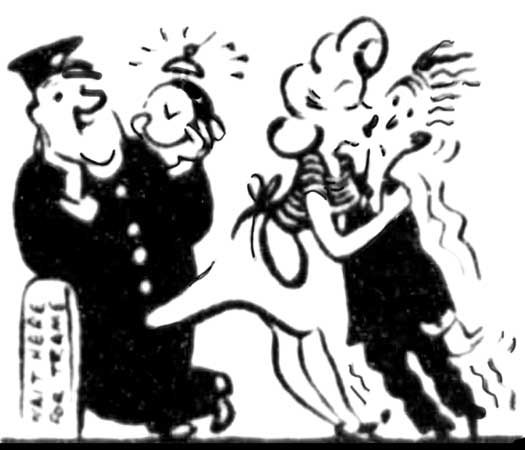 SYDNEY, Tues: A constable timed a two-minute kiss that a young girl gave a youth in the street, he told Newtown Court yesterday. Constable Adams gave evidence against Elizabeth Sanchez, 18, waitress, charged with having behaved offensively in King street, Newtown. Constable Adams said that Miss Sanchez, who was one of a group of boys and girls, threw her arms round a boy’s neck and kissed him. “The kiss lasted for two minutes,” Constable Adams said. Miss Sanchez said she did not remember kissing the youth, and Mr. Scroops, SM, released her on a good behaviour bond for 12 months.
SYDNEY, Tues: A constable timed a two-minute kiss that a young girl gave a youth in the street, he told Newtown Court yesterday. Constable Adams gave evidence against Elizabeth Sanchez, 18, waitress, charged with having behaved offensively in King street, Newtown. Constable Adams said that Miss Sanchez, who was one of a group of boys and girls, threw her arms round a boy’s neck and kissed him. “The kiss lasted for two minutes,” Constable Adams said. Miss Sanchez said she did not remember kissing the youth, and Mr. Scroops, SM, released her on a good behaviour bond for 12 months.
News (Adelaide, SA : 1923 – 1954), Tuesday 1 April 1952, page 1
The Kiss
Ronald James
“You had better go, Johnny,” she said softly. He twisted his hat in his hands and said: “You sound as though you mean that.” “The past is dead.” she said. “I have no wish to bring it alive. You killed it, Johnny. You know that.” He stole a glance at her, but she stood by the table, her face expressionless. 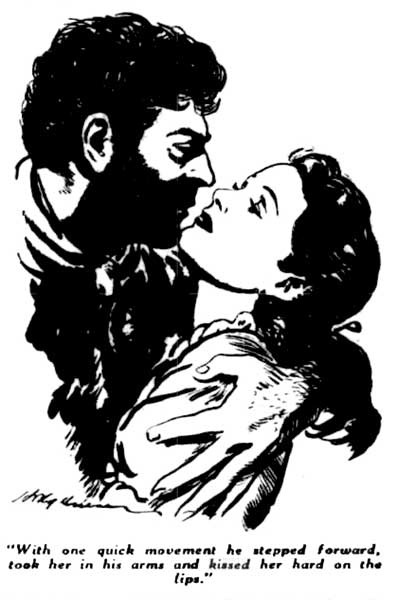 He straightened and turned to face her. “Well …” he said, and stopped. She was watching him, one hand resting on the table top. His tongue ran over his lips. With one quick movement he stepped forward, took her in his arms and kissed her hard on the lips. Under its thin covering he felt her body tense as it was pressed against the table, but she made no effort to get away. She stood there in his arms, impassive. He let her go and stepped back and she thought: soon my husband will come in, give me a brief, dusty kiss and drop his body tiredly into a chair. He will take his boots off and wriggle his toes in his socks and grunt, and there will be no passion in his kiss. He will not press his lips against mine until it hurts, or send the fire racing through my body. “Why did you do that?” she asked, her hands pressing hard on the table behind her. The softness of her lips was still with him and his body hot with desire. The feel of her was in his arms and the moistness of her skin was still stirring his senses. “Just for old time’s sake.” he said.
He straightened and turned to face her. “Well …” he said, and stopped. She was watching him, one hand resting on the table top. His tongue ran over his lips. With one quick movement he stepped forward, took her in his arms and kissed her hard on the lips. Under its thin covering he felt her body tense as it was pressed against the table, but she made no effort to get away. She stood there in his arms, impassive. He let her go and stepped back and she thought: soon my husband will come in, give me a brief, dusty kiss and drop his body tiredly into a chair. He will take his boots off and wriggle his toes in his socks and grunt, and there will be no passion in his kiss. He will not press his lips against mine until it hurts, or send the fire racing through my body. “Why did you do that?” she asked, her hands pressing hard on the table behind her. The softness of her lips was still with him and his body hot with desire. The feel of her was in his arms and the moistness of her skin was still stirring his senses. “Just for old time’s sake.” he said.
AUSTRALIA SHORT STORY (1953, January 28). Weekly Times (Melbourne, Vic. : 1869 – 1954), p. 60.
POST IT TO MR. ARGUS
MRS. E.J.M., Werribee, comes up with a question that must now intrigue many of us who like to write letters.
As long as I can remember, X at the bottom of a letter has signified a kiss. Why is it? Why do we write a kiss that way?
Years ago, Mrs. M., uneducated people, when making an X to signify their signature, kissed it: much as we today “kiss the Book” when signifying an oath. Eventually the X came to mean a kiss.
Argus (Melbourne, Vic. : 1848 – 1957), Tuesday 29 March 1955, page 3
Kissing is a serious problem for young men
It’s not just the question of how, but of WHEN! I can remember the trouble I had in kissing Mabel Hoggett. She was a big, athletic girl, good at golf and dog-handling. I used to be nervous and miss my opportunities to kiss her. Then I would dive at her at the wrong time. Once I seized her when she was making a billiards shot. She pushed me away and said: “Are you nuts?” I had another try while she was washing her fox terrier. It bit me on the hand, and she said: “Good dog!”
Ross Campbell Writes… KISS OR MISS (1956, March 7). The Australian Women’s Weekly (1933 – 1982), p. 10.
MAN CLAIMS SIGHT RESTORED BY A KISS
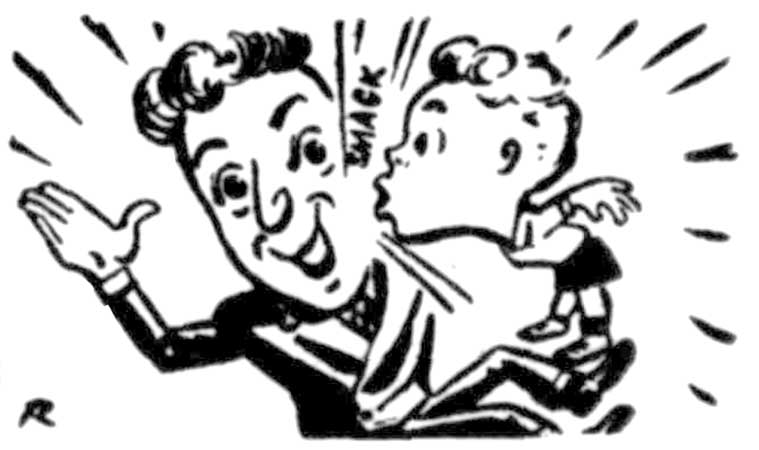 Gilbert Sawyer, 42, claims his sight was restored by a kiss. Sawyer, who was blinded in an explosion about two years ago, prayed for months that his sight would return and then gave up hope. He visited friends on Sunday and was sitting on the lawn chatting with his host when the host’s three-years-old son kissed him on the cheek. Sawyer jumped to his feet shouting “I can see, I can see everything.” Sawyer stated today that the sight had returned to his left eye only, but he could see perfectly. “I ask for nothing more,” he added.
Gilbert Sawyer, 42, claims his sight was restored by a kiss. Sawyer, who was blinded in an explosion about two years ago, prayed for months that his sight would return and then gave up hope. He visited friends on Sunday and was sitting on the lawn chatting with his host when the host’s three-years-old son kissed him on the cheek. Sawyer jumped to his feet shouting “I can see, I can see everything.” Sawyer stated today that the sight had returned to his left eye only, but he could see perfectly. “I ask for nothing more,” he added.
Brisbane Telegraph (Qld. : 1948 – 1954), Wednesday 7 March 1951, page 6
- A kiss makes the heart young again and wipes out the years – Rupert Brooke
- Excuse me while I kiss the sky – Jimi Hendrix
- A friend is always good to have, but a lover’s kiss is better than angels raining down on me – Dave Matthews

